Agenda Echoes Of Harmony: Empowering Sustainability, Resonating Within, Impacting Beyond At Sabancı Holding, our Nature Agenda reflects the harmony through ambitious goals and initiatives in decarbonization, water management, biodiversity, and circular economy, fostering a sustainable relationship between business and nature.
As Sabancı Holding, we recognize the critical role of nature in shaping our sustainable future. Our commitment extends beyond the conventional approach; we aspire to be leaders in championing a Nature-Based approach. By setting ambitious goals to promote biodiversity, conservation, and even regeneration, and to foster circular business models, our aim is to pave the way for a more harmonious relationship between business and nature.
In this regard, our efforts have expanded from decarbonization to a comprehensive nature program, employing both an outside-in and inside-out approach in line with the double materiality approach. Sabancı Holding’s Nature Agenda includes our efforts in four key areas, namely Decarbonization Initiatives, Water Management, Biodiversity and Circular Economy.
The Efforts Extended from Focusing on the Impact of
the Operations to the Impact on The Business Model
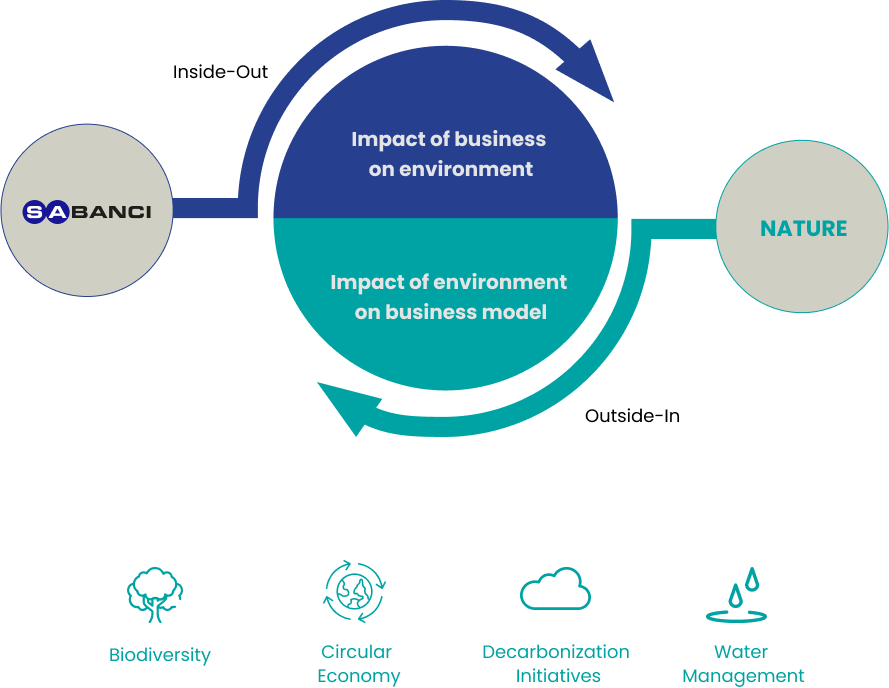
Decarbonization
Initiatives
In alignment with our strategic framework, Sabancı Group has formulated a comprehensive decarbonization strategy to address potential risks for achieving the 1.5°C goal. Embarking on this journey in 2021, we have elevated our commitment by introducing interim GHG (Greenhouse Gas) emissions reduction targets within the scope of our Nature Agenda in 2023.
This effort was vital in identifying key areas for improvement towards our Net Zero Emissions target. Specific measures and actions for both Sabancı Holding and its Group companies were outlined to mitigate their environmental impact. Besides our interim GHG emissions reduction target, Sabancı Holding has determined 15 Decarbonization Levers designed to accelerate the transition process, effectively decarbonizing the various industries in which Sabancı Group is actively engaged.
Water
Management
At Sabancı Group, we see water as a fundamental natural capital for all sectors in which we operate alongside other stakeholders, including society at large. We are aware that water supply disruption will adversely affect all business processes and our societies.
To mitigate potential risks associated with water scarcity and effectively manage this challenge, we initiated a comprehensive water project across the Group in 2023. With this project, our aim was to establish an alignment on key water-related definitions, calculation methodologies and metrics across all Group companies in accordance with their respective sectors.
As a result of this alignment, we defined a medium-term water consumption target across our Group companies and restated our baseline figures due to changes in boundaries and definitions.
In 2023, our total water consumption decreased to 8 million m3, while total water discharged increased to 334.2 million m3.
Across the Group, the percentage of water recycled and reused in 2023 was 38%. In the future, we will continue to prioritize increasing water efficiency through related projects, especially in water and emission-intensive sectors.
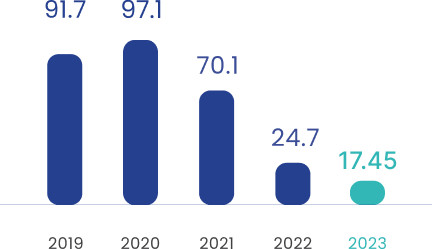
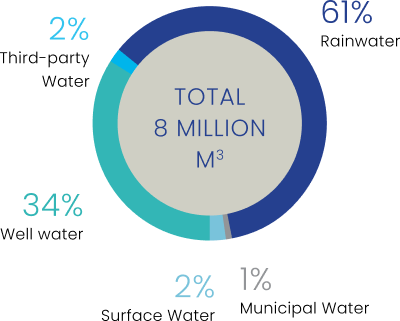
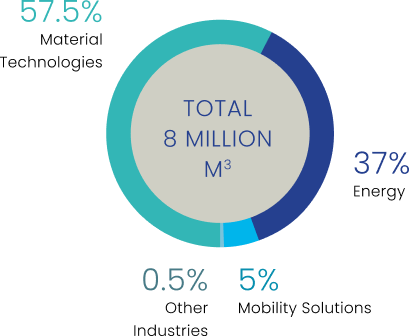
* SBS BV is not included
Biodiversity
In 2023, Sabancı Group launched a comprehensive biodiversity project across the entire organization to address the risks involved and mitigate their potential impact.
Recognizing that the journey to establish biodiversity targets is not a one-size-fits-all approach, Group Companies have embarked on a customized process to align their operations with nature-related standards.
The project commenced with comprehensive training and alignment efforts to ensure that all employees in relevant departments understood the critical importance of biodiversity preservation.
Following this, prioritized Group companies systematically identified priority areas and locations where their operations intersect with sensitive ecosystems in accordance with the Taskforce on Nature-related Financial Disclosures (TNFD) Guidance on the assessment of priority locations.
Through this evaluation, we assessed the potential impacts and dependencies of our activities on biodiversity in relevant geographies providing us a clear understanding of the risks and opportunities associated with our operations. In this direction, we have taken the effective management of our priority issue of biodiversity and nature positive actions one level higher.
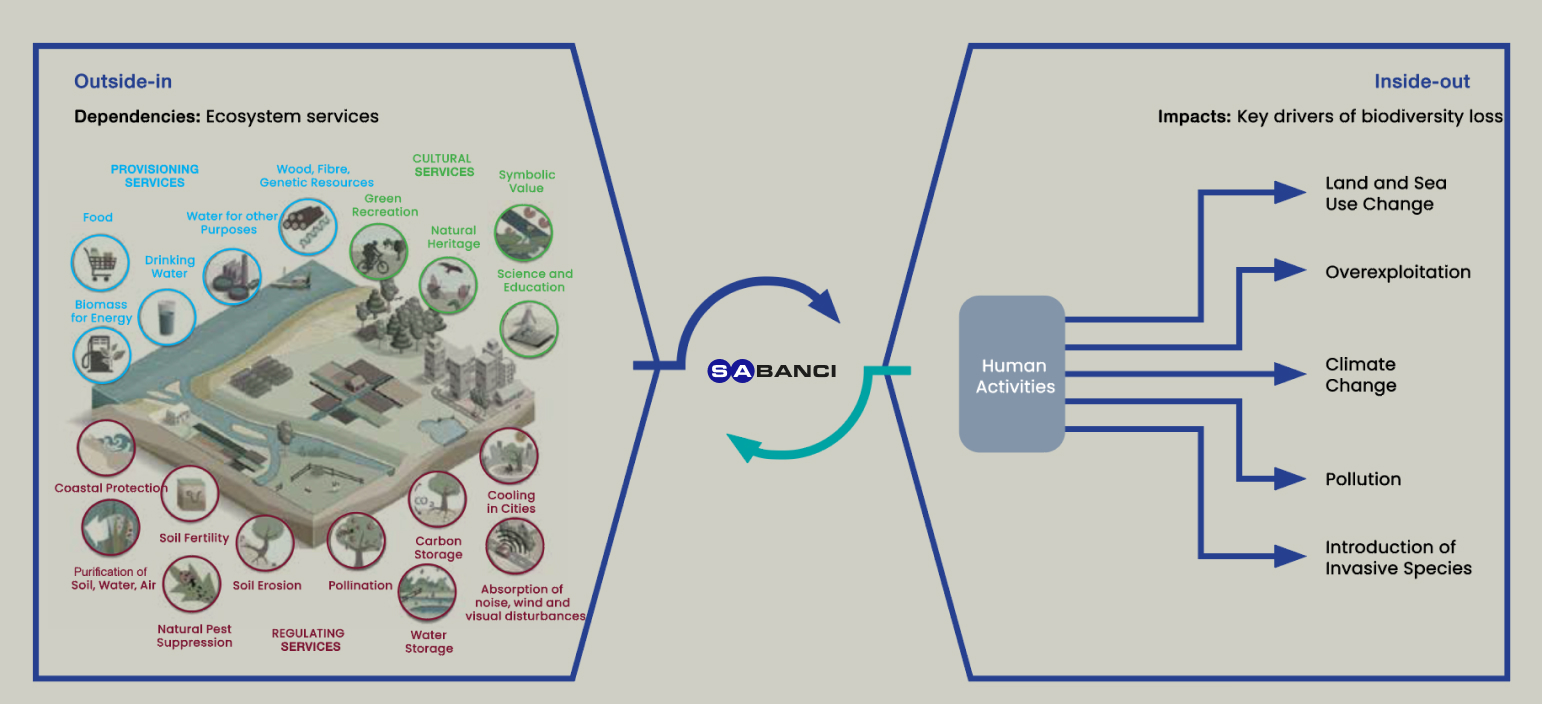
Circular
Economy
According to the recent Circularity Gap Report (CGR), the global economy has seen an increase in material consumption exceeding half a trillion tonnes over the past six years. Encouragingly, the circular economy has reached megatrend status. The number of discussions, debates and articles related to the circular economy has almost tripled over the past five years.
At Sabancı Holding, we are committed to strategically investing in a sustainable future strengthened by our circular economy framework. Recognizing the urgent need to address material scarcity, we focus on enhancing resource productivity across both our existing operations and new investments. Our goal is to minimize reliance on landfills and incineration, aiming for Zero Waste by 2050.
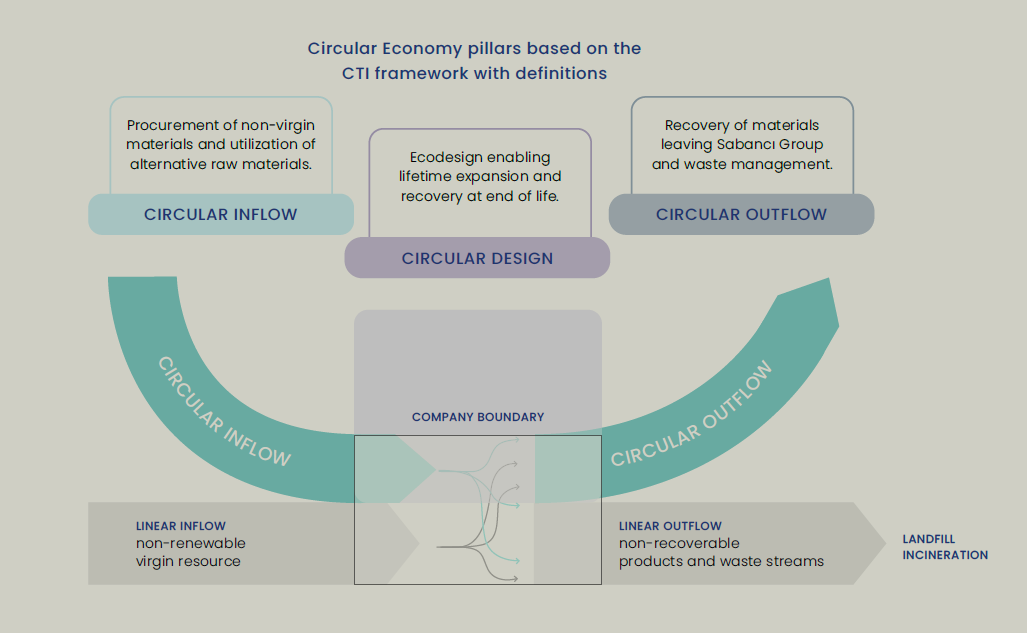
& Partnerships
Principles
Routes
* Relevant Group companies refer to Akçansa, Çimsa, Temsa, Teknosa, Enerjisa Enerji and Enerjisa Üretim which are in scope of the Circular Economy Project.
** Further analysis needed to understand current % circular inflow.
*** Key products are identified at the company level. Principles are durability, repairability and circular composition.
**** Incineration of hazardous waste is out of scope.
 Sustainability for a Better
Life 2023 Report
Sustainability for a Better
Life 2023 Report